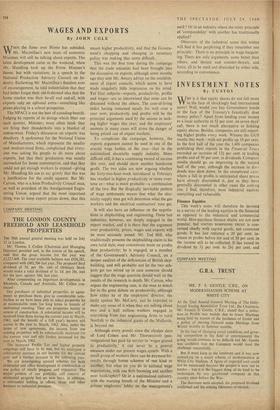WAGES AND EXPORTS
By JOHN COLE THEN the fume over Home has subsided, V Mr. Macmillan's new team of economic M i n tisters will still be talking about exports. The ;t development came at the weekend, when late Maudling took up the Prime Minister's M ne, but with variations, in a speech to the the ional Production Advisory Council on In- Nat Ty. Eschewing Mr. Macmillan's flatulent note dust encouragement, he told industrialists that they of better forget their old-fashioned idea that the had le market was their be-all and end-all, with hon orts only an optional extra—something like exp no-playing in a school prospectus. pia The NPACI is not the best of sounding-boards. ging by reports of its doings which filter out Jud h quarter, Ministers must often think they eacl firing their thunderbolts into a blanket of are on-wool. Friday's discussion on exports was cot ultory. A spokesman for the National Union des Manufacturers, which represents the smaller of medium-sized firms, complained that every- and was asking his people to do more about one orts, but that their production was mostly exp marked for home consumption, and that they (tan Id not get enough workers to expand—giving cou Maudling his cue to say grimly that this was Mr a j ustification for the credit squeeze. But Mr. Car Ton, who is a keen Productivity Council man, Nell as president of the Amalgamated Engin- as 1 ing Union, argued that the most important eeri
ig was to keep export prices down, that this thir
meant higher productivity, and that the Govern- ment's chopping and changing in monetary policy was making that more difficult.
This was the first time during the campaign that the trade unionists had been brought into the discussion on exports, although some months ago they sent Mr. Amory advice on the establish- ment of export councils, which seems to have made singularly little impression on his mind. Yet four subjects—exports, productivity, profits and wages—are so intertwined that none can be discussed without the others. The cost-of-living index having remained steady for well over a year now, productivity and profits will be the principal arguments used by the unions in seek- ing higher wages this year; and the employers' answers in many cases will stress the danger of being priced out of export markets.
To complicate the campaign, however, the exports argument cannot be used in one of the crucial wage battles of the year—that in the nationalised electricity supply industry. More difficult still, it has a continuing record of success this year, and should show another handsome profit. The two sides are now arguing whether the forty-two-hour-week introduced in February has resulted in higher productivity or more over- time or—what is more probable—a combination of the two. But the illogically inevitable pattern of wage settlements means that what the elec- tricity supply men get will determine what the gas workers and the electrical contractors' men get.
It will also have an influence on the negotia- tions in shipbuilding and engineering. These last industries, however, are deeply engaged in the export market, and it is there that the argument over productivity, prices, wages and exports will be most seriously joined. Mr. Ted Hill, who traditionally presents the shipbuilding claim in his own lurid style,.may concentrate more on profits than productivity; he is engaged, as a member of the Government's Advisory Council, on a deeper analysis of the deficiencies of British ship- building, and will probably not let the two sub- jects get too mixed up in case someone should suggest that the wage question should wait on the results of the research in depth. Mr. Carron, who argues the engineering case, is the man to watch for in the great debate on productivity, although how either he or the employers' director, the tartly spoken Mr. McCarty, can be expected to make any sense of it when they are talking about two and a half million workers engaged in everything from tiny engineering firms in rural Norfolk to the industrial giants of the Midlands, is beyond me.
Although every, pundit since the choppy days of Lord Cohen and Mr. Thorneycroft (pre- resignation) has paid lip service to 'wages geared to productivity,' it can never be a general measure under our present wages system. With a small group of workers there can be payment:by- results through bonus schemes of one kind or another; but what do you do in national wage negotiations, with one firm booming and another near bankruptcy? Or it a nationalised industry, with the warning breath of the Minister and a private employers' lobby on the management's neck? Or in an industry where the misty principle of 'comparability' with another has traditionally applied?
Observers of the industrial scene this winter will find it less perplexing if they remember one principle : There is no principle in wage-bargain- ing. There are only arguments, some better than others, and threats and counter-threats, and force, all to be used and discarded by either side, according to convenience.


































 Previous page
Previous page